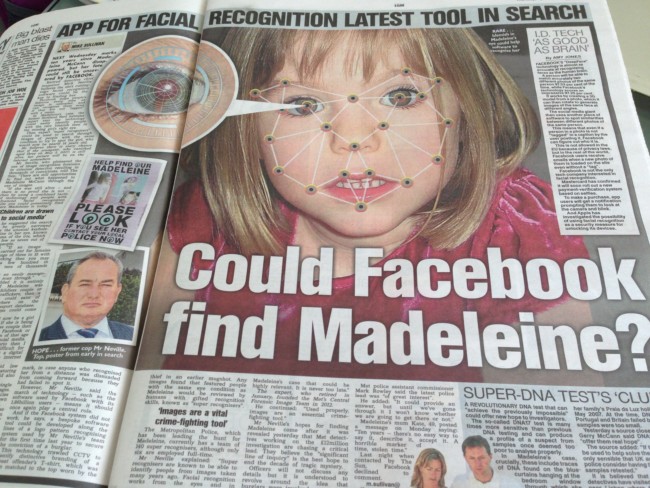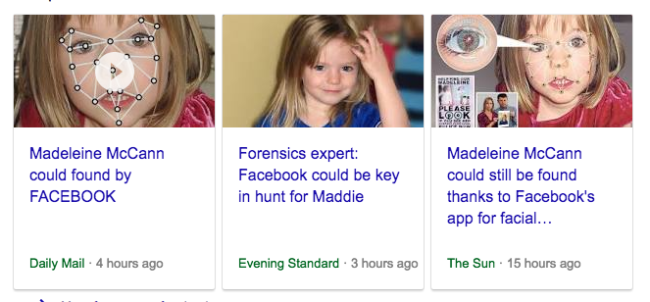Ex-copper Number 3429 shares this thought on Madeleine McCann and Facebook’s chances of finding her
The Sun has some Madeleine McCann tenth anniversary news. Across two pages, the paper asks “Could Facebook find Madeleine?” It hasn’t found her so far, and the site’s been up and running for a few years now. But it could. Could is the new buzzword in media and police reporting on the investigation. Based on the premise that anything could happen, we’d say ‘yes’, Facebook could find Madeleine McCann. We hope it does.
And while we’re on it, you can get odds on all sort of things that could happen. You could win the lottery – the odds are around 1 in 13,983,816. You just need to buy a ticket and take the plunge. So “retired detective” Mick Neville is the latest to buy his ticket for the ‘Our Maddie’ charabanc for retired coppers – destination: media – and delved into Facebook. He now “believes the site’s cutting edge face recognition software could be the key to finding here”. The detective reckons that if Madeleine McCann is using Facebook to chat to mates and spread fake news about Hillary Clinton, she stands a better chance to being found than if she not on the web. Moreover, if her kidnappers or new parents are posting photos of her.
“If she is still alive – and there is no proof she is not,” says Neville, “then by using a combined tactic of technology and people with advanced facial recognition skills you could potentially find where Madeleine is today.” Yeah. Ten years of thinking went into that. And you can’t knock it for insight, precision and usefulness.
As the Met Police read the Sun and utter a collective ‘DANG!’ – and the press all race to copy the Sun’s story (see above) – we read if a DNA test that “could offer hope to investigators”. Called DNA17, the test “can produce a profile of a suspect from samples once deemed too small to analyse properly”. A “source close to” Kate McCann says the technology “seems to offer them real hope… If the test could be used to help solve the case it seems only sensible that UK and Portuguese police consider having he crime scene samples retested.”
Sounds right. But how new is the test? It’s new – but not breaking-news new. The CPS tells us:
DNA-17 is the term that has been adopted to describe the next generation of DNA (Deoxyribonucleic Acid) profiling methodologies to be utilised by the National DNA Database (NDNAD).
Currently, samples are profiled using the SGMPlus methodology, but from 24 July 2014, samples will be profiled using a DNA-17 profiling methodology.
News from July 2014 is news in April 2017.
Such are the facts.
Posted: 27th, April 2017 | In: Madeleine McCann, Reviews, Tabloids Comment | TrackBack | Permalink




